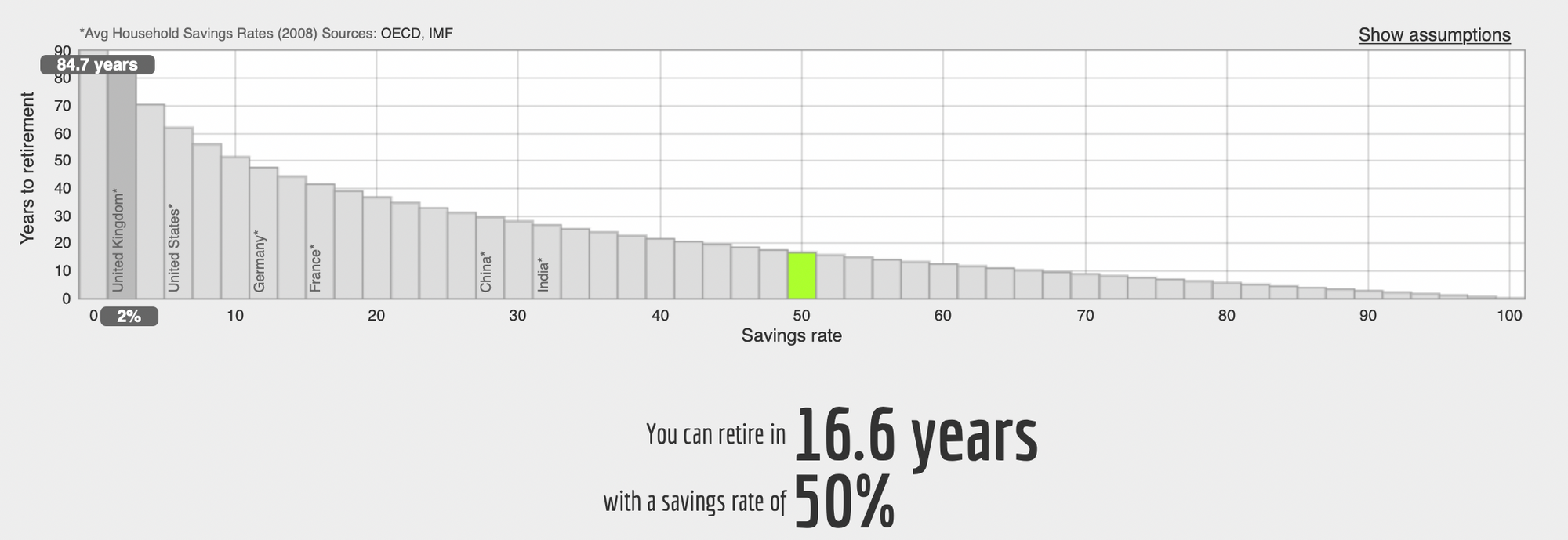Today we are going to talk about what is the most important number in your finances. We will also talk about why it is the most important number and how it will affect your financial household and can even predict when you can retire if you wish to.
In lesson 1 we discussed don't spend more than you earn, basically resulting in more money leaving your wallet than entering it. Now we are going to discuss the opposite. We discuss what happens if you spend LESS than you earn.
For that we'll introduce savings rate. Savings rate is the amount of money you don't spend (save) divided by the amount you earn. You can calculate the savings rate for a year, a month or a week. Here the formula:
savings rate = (money earned - money spend) / money earned x 100
Ok let's do a few examples. Let start with someone who is living from paycheck to paycheck. So basically spending all the money earned. For example someone earns $2000 per month and spends $2000 per month. Lets plug that into our formula
savings rate = ($2000 - $2000) / $2000 x 100 = 0
So if spend all the money you earn you have you have a savings rate of 0. Ok makes sense. Now lets say someone manages to save $200 per month, by spending $1800 with earnings of $2000. How would that affect the savings rate.
savings rate = ($2000 - $1800) / $2000 x 100 = 10
By saving $200 a month you have a savings rate of 10. When you save $500 you have a savings rate of 25. On the other hand if you spend more than you earn you will have a negative savings rate, which you want to avoid at all cost, as that is not really sustainable.
When you have a positive savings rate and you invest your savings, you can make your saved money start working for you, ie money makes money. There are many ways to invest you money, but the easiest one is to invest in the US stock market. If you invest in the US stock market and reinvest your dividends, on average you will get a return of 7% after inflation. If this last sentence went over your head, no worries for now, we will cover this in another blog post.
With your savings rate you can now predict when you can retire. If you have a savings rate of 0% you will off course never be able to retire. If you save 10%, which sounds pretty good it takes a disappointing 51 years before you can retire. Now if you can save 20% of your salary, you can retire after about 37 years, which is already 14 years sooner.
Now if you could save 50% of your income you can retire after 17 years. That means someone who graduated from college and socks away 50% of their income can retire before their 40th birthday. If you are in your 40s and have saved little or nothing it is not too late, you can still retire before your 70's.
Why does this work? Because the more you save the less money you need to live on. Therefor in your retirement you also need less money. Here a chart that shows how savings rate affects how many years you need to save before you can retire.

What is your current savings rate? With the calculator below you can quickly calculate your years to retirements. Just enter the savings rate.
If you already have some savings use this retirement calculator I created. It takes income, expenses and savings. It will calculate the savings rate and years to retirement.
This also explains why someone who earns a half a million dollars a year and spends it all on houses, boats and travel without any savings will need to continue working forever to support his lifestyle.
Now you have seen how long before you can retire, could you save some more? Can you save another 5%?
If you goal is not retirement and you love your work. There are still many reasons to have savings at hand, aka being financially independent. For example if you are no longer able to work, get laid off, or just have FY money when things turn bad at work.

